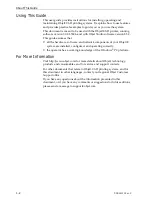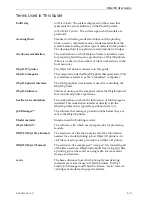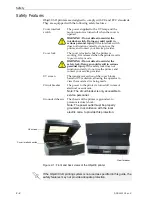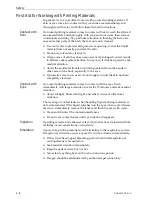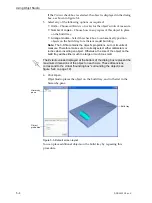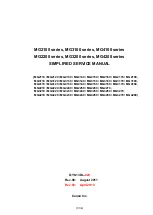
Introducing the Objet30 3-D Printing System
3–4
DOC-24000 Rev. C
Printing Materials
Objet30
printers
produce
models
by
jetting
thin
layers
of
printing
materials
on
the
build
tray,
until
the
complete
model
is
formed.
Two
types
of
material
are
used
in
this
process:
•
Model
material—which
makes
up
the
finished
model
•
Support
material—which
fills
gaps
and
spaces
in
the
model
during
printing,
and
is
removed
after
printing
Available
Materials
Two
groups
of
Model
materials
are
available
for
the
Objet30
printer—
•
Vero
Materials
in
this
group
are
suitable
for
general
model
making,
and
come
in
a
choice
of
color
(white,
blue,
gray,
and
black).
They
offer
the
following
features:
thermo
‐
plastics
simulation
(appearance
and
feel)
high
dimensional
stability
(especially
with
VeroGray™)
excellent
detail
and
surface
quality
•
Durus
DurusWhite™
is
currently
available,
with
the
following
features:
polypropylene
simulation
(appearance
and
feel)
enhanced
toughness
and
flexibility—suitable
for
reusable
containers
and
other
snap
‐
fit
applications
For
up
‐
to
‐
date
information
about
Objet
printing
materials
and
their
properties,
go
to
www.objet.com/Materials.
Storage
Materials
used
for
printing
models
with
Objet30
printers
are
made
of
resins,
which
are
composed
of
reactive
monomers
and
oligomers.
Although
printing
materials
are
supplied
in
sealed,
UV
‐
proof
cartridges,
care
must
be
taken
when
storing
and
handling
them.
Follow
these
guidelines
to
protect
operators
and
the
environment,
and
to
ensure
optimum
results.
•
To
ensure
product
stability,
do
not
allow
these
materials
to
come
into
contact
with
metal.
Plastics
made
from
monomer
‐
soluble
substances
(such
as
polystyrene
or
polyvinyl
chloride)
are
not
suitable
for
storing
Objet
printing
materials.
•
When
not
in
use,
keep
material
cartridges
tightly
sealed
to
prevent
contamination,
the
effects
of
exposure
to
UV
radiation,
and
accidental
spillage.
•
Store
material
cartridges
indoors,
in
a
dry
area
with
adequate
ventilation,
between
16–27
degrees
Celsius
(60–81
degrees
Fahrenheit).
If
exposed
to
heat
or
flames,
cartridges
may
burst
or
ignite.
•
Signs
of
premature
polymerization
in
material
cartridges
may
include
bulging,
leaking,
the
emission
of
heat,
and
unusual
odor.
Exposure
to
heat
can
cause
resin
to
gel
in
the
cartridge.
•
Make
sure
that
material
cartridges
are
stored
in
accordance
with
all
local
regulations
and
other
applicable
requirements.

